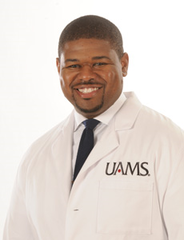 An Interview with Johnathan Goree, MD Director of Chronic Pain and Opioid Stewardship University of Arkansas for Medical Sciences NaRCAD Training Alumnus by Kristina Stefanini, Program Coordinator at NaRCAD Tags: Detailing Visits, Opioid Safety, Training NaRCAD: Thanks for talking with me today! Can you tell me a little bit about yourself and how you ended up in pain management? Johnathan Goree: I’m from Arkansas originally. After completing college at Washington University in St. Louis, medical school and residency at Cornell, and a pain medicine fellowship at Emory, I was recruited to start the chronic pain division at the University of Arkansas for Medical Sciences – 2 miles away from where I went to high school. I’m proud to work in Arkansas; Arkansas is such a poor and rural state, so we don’t often have the resources that other states have.  I went into anesthesiology because I wanted to be the best prepared doctor for an emergency, but I moved into pain medicine because I missed the 1-on-1 patient contact and longitudinal patient care. Here are some other things that lead me into pain medicine. After getting my wisdom teeth removed, I was given too much fentanyl during the procedure resulting in being given Narcan to wake up. That was the first time in my life I experienced 10/10 pain. It allowed me to understand how pain can completely dominate someone’s consciousness. I am also passionate about pain management in minority communities. Many in those communities feel that their pain is undertreated, and evidence backs that up. NaRCAD: As a physician, what are some of the barriers that detailers may have talking to clinicians about pain management? How can these be navigated? Johnathan Goree: Every physician will say the number one barrier is time. While most physicians are excited to learn about anything that will improve patient care, unfortunately, physicians are usually not in control of their schedule.
NaRCAD: How can clinicians act as champions in an academic detailing campaign? Johnathan Goree: One way physicians can help is with the crafting of educational materials. Physicians know how physicians think and can help by crafting a message that may better catch attention. Another is by dedicating time to answer follow-up questions from detailers and other clinicians. In my field of chronic pain management, detailers that don't have a clinical background may not know how to answer questions on specific off-label situations or treatment of specific pains. A follow-up visit or call with a clinician can help with that. NaRCAD: Anything else you’d like to add for our readers? Johnathan Goree: More praise for you guys – your course is excellent! Really understanding the science and method behind academic detailing made me excited to be a part of it. I hope more physicians engage both as detailers and as champions. I think it’s really important. Biography.
Johnathan Goree, MD, Director of Chronic Pain and Opioid Stewardship University of Arkansas for Medical Sciences Board certified in anesthesiology and pain medicine, Dr. Johnathan Goree received his Bachelor of Arts in biology from Washington University in St. Louis. He then moved to New York City where he completed both his medical degree and a residency in anesthesiology at the Weill College of Medicine at Cornell University. Following his time in Manhattan, he completed a fellowship in chronic pain medicine at Emory University Hospital in Atlanta, Georgia. In 2014, Dr. Goree returned home to Little Rock, Arkansas to join the faculty at University of Arkansas for Medical Sciences where he serves as the Director of the Chronic Pain Division and an Assistant Professor in the Department of Anesthesiology. He primarily focuses on the treatment of chronic pain conditions using opiate sparing, minimally invasive techniques. His specific research interests include complex regional pain syndrome, neuromodulation, and the effects of opioid education initiatives on patient outcomes.
0 Comments
Leave a Reply. |
Highlighting Best PracticesWe highlight what's working in clinical education through interviews, features, event recaps, and guest blogs, offering clinical educators the chance to share successes and lessons learned from around the country & beyond. Search Archives
|
